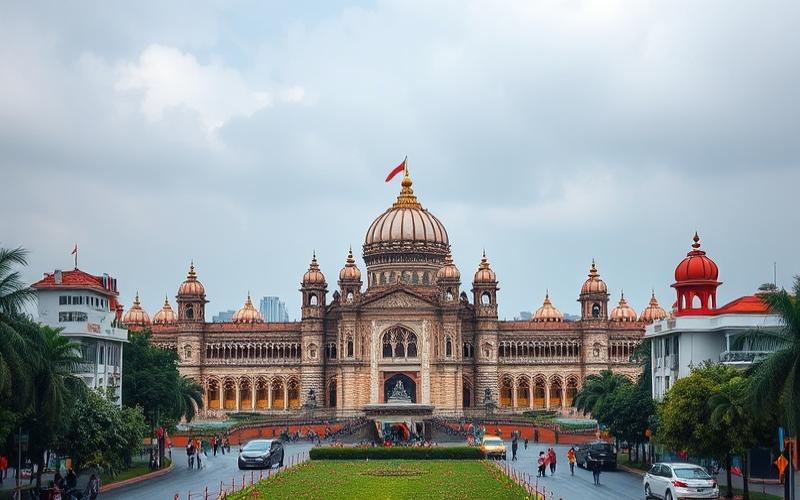
 Published on and written by Cyril Jarnias
Published on and written by Cyril Jarnias
Navigating the world of international financial management can pose a major challenge for expatriates, particularly when it comes to choosing appropriate banking services in countries like India. With a rapidly expanding economy and a complex financial landscape, India requires a well-informed approach to optimize finances.
Expatriates often face various challenges, ranging from regulatory differences to currency fluctuations, making the selection of suitable banking partners essential to facilitate transactions and ensure the security of their overseas assets.
This article explores available options and provides strategic recommendations to capitalize on the unique opportunities offered by the Indian market, while minimizing potential risks associated with managing finances in this dynamic context.
Choosing Banking Services Suitable for International Mobility
Essential Features to Consider for Expatriates in India:
- Opening a Bank Account in India:
- An Indian rupee (INR) account is essential for daily life (housing, salary, local payments).
- Some institutions also offer foreign currency accounts (Foreign Currency Non-Resident Account, FCNR), primarily for Non-Resident Indians (NRI). For non-Indian expatriates, access to these accounts is limited and depends on resident status.
- Required documents: visa, residence permit, passport, proof of local address, PAN number (for taxation), sometimes a recommendation letter.
- Selection Criteria for Expatriate Banks:
- Reduced transfer fees for incoming and outgoing international wire transfers.
- Competitive exchange rates to limit value loss during currency conversions.
- Multi-channel online management: secure account access from abroad, mobile applications, notifications, multi-currency management.
- Personalized assistance: services dedicated to expatriates, multilingual advisors (English, sometimes French), documentation in English.
- Wealth management solutions: tax assistance, investments suitable for non-residents, international savings products, access to multi-currency portfolios.
- International network: branch presence in multiple countries, ATM accessibility, international customer support.
Comparison Table of Banking Criteria for Expatriates in India
| Criterion | Explanation / Benefits |
|---|---|
| INR Account Opening | Local payments, daily management, salary deposit |
| Foreign Currency Account | Limited to NRI/OCI, useful for investments and international transfers |
| Transfer Fees | Reduced to limit international wire transfer costs |
| Exchange Rate | Competitive to optimize conversions |
| Online Management | Global access, simplicity, security |
| Multilingual Advisors | Facilitates communication and understanding of products |
| Wealth Management | Tax optimization, investments tailored for expatriates |
| International Support | Availability in multiple countries, 24/7 assistance |
Concrete Examples of Banks Suitable for Expatriates in India:
- HSBC India: multi-currency account, online management, services dedicated to expatriates, wealth management assistance, multilingual advisors.
- Citibank India: INR and foreign currency accounts for NRIs, services in English, international online management.
- ICICI Bank and HDFC Bank: extensive network, services in English, easy account access from abroad, efficient mobile application.
- State Bank of India (SBI): offers services for NRIs, international presence, remote management capability.
Local Regulations Influencing Banking Choices:
- Residency Status: only residents (stay >182 days/year) can open a standard resident account. Non-residents must opt for specific accounts (NRI, PIO, OCI).
- Mandatory PAN Number: required for account opening and local taxation.
- Strict Documentation: proof of residence, visa, and sometimes recommendation letter required.
- Regulation on Cash Deposits and Withdrawals: highly regulated, particularly to combat money laundering and fraud.
- Credit Card Acquisition: more difficult without local banking history.
Key Takeaways:
For expatriates in India, it is essential to compare offers based on ease of opening, online management, transfer fees, and personalized services. International or internationally-oriented Indian banks are the most suitable, provided eligibility criteria based on residency status and required documentation are carefully verified.
Good to Know:
For expatriates in India, choosing suitable banking services is crucial to facilitate their international mobility. It is essential to consider opening bank accounts in local and foreign currencies, enabling effective management of finances in Indian rupees and other currencies. Banks such as ICICI Bank and HDFC offer specialized services for expatriates, including reduced transfer fees and competitive exchange rates, as well as online platforms accessible from multiple countries. Additionally, wealth management is simplified through the availability of multilingual advisors who can provide personalized recommendations. In India, regulations often require specific documents for account opening, such as a valid residence visa and proof of local address, which can influence bank selection. Expatriates will therefore benefit from carefully checking these criteria before committing to a bank, to maximize benefits and minimize potential obstacles in managing their international finances.
Managing Exchange Rate Fluctuations to Optimize Finances
Understanding exchange rates is fundamental for any expatriate in India, as currency fluctuations directly impact personal finances, whether regarding income, daily expenses, or investments.
Impact of Exchange Rate Fluctuations on Expatriate Life:
- When the Indian rupee (INR) depreciates against the euro or dollar, transfers made from abroad can yield more rupees, but expenses or investments made in foreign currency become more expensive.
- Conversely, rupee appreciation decreases the value of received transfers and may increase the local cost of living for an expatriate paid in another currency.
- Income (salaries, pensions, etc.) paid in a currency different from that used in India undergoes variations that can alter purchasing power.
- Local expenses (rent, education, services) and fund transfers to or from the home country are sensitive to these variations, potentially leading to significant losses or gains depending on the transaction timing.
Examples of Recent INR Exchange Rate Evolution:
| Date | USD/INR Rate | 12-Month Variation |
|---|---|---|
| August 15, 2025 | 87.51 | -4.34% |
| August 26, 2025 | 87.64 | +0.02% (over 1 day) |
The Indian rupee weakened by nearly 4.34% in one year, illustrating possible volatility.
Strategies to Mitigate Exchange Rate Risk:
- Multi-currency bank accounts: allow holding and managing multiple currencies, limiting exposure to immediate fluctuations.
- Forward contracts: lock in an exchange rate for a future transaction, securing the transferred or received amount.
- Currency options: offer the possibility, but not obligation, to exchange at a predefined rate, useful for hedging against unfavorable variations.
- Investment diversification: invest in different countries or currencies to reduce overall risk.
Practical Tips for Managing Variations:
- Regularly monitor exchange rates using mobile applications, email alerts, or specialized websites.
- Plan significant fund transfers when the rate is favorable, splitting operations if necessary.
- Seek guidance from a financial advisor specialized in expatriation to anticipate risks and opportunities.
Tools and Services Offered by International Banks in India:
- Online platforms enabling instant conversions and access to preferential rates.
- Dedicated advisors for expatriate clients for multi-currency portfolio management.
- Access to hedging products against exchange rate risk (forwards, options, swaps).
- Automatic notifications on rate evolution and personalized recommendations.
Key Takeaways:
Mastering exchange rates and using appropriate tools enables expatriates in India to secure their income, optimize their transfers, and preserve their purchasing power in the face of currency market volatility.
Good to Know:
Understanding exchange rates is crucial for expatriates in India, as fluctuations can significantly affect their finances. Income and expenses can vary due to these fluctuations, impacting fund transfers, local payments, and investments. To mitigate exchange rate risk, it is advisable to use multi-currency bank accounts, which allow easy management of multiple currencies, or resort to forward contracts and currency options to protect against future variations. Regularly monitoring exchange rates and choosing the right moment for significant transactions can also promote more stable financial management. International banks in India often offer specialized tools and services, such as personalized advice on the currency market, which help maintain balanced finances despite market volatility.
Optimizing Cross-Border Money Transfers
Strategies and Technologies to Optimize Cross-Border Money Transfers To and From India:
Digital Platforms and Fintechs
- Use of mobile applications (Paysend, Xoom, Monisnap, Western Union) for fast, traceable, and often instant transfers.
- Ability to transfer to UPI cards, bank accounts, or offer cash withdrawal through a wide partner network.
- Payment via bank card, bank account, PayPal, or mobile wallet.
- Fixed or zero fees, transparent display of exchange rate and amount received before validation.
- 24/7 international customer service and bank-level security (Visa, Mastercard, PCI DSS, FCA certifications).
Examples of Popular Platforms:
- Paysend: low or no fees, instant delivery, real-time displayed exchange rates.
- Xoom (PayPal subsidiary): fast transfers to major Indian banks and UPI.
- Monisnap (MONI): fee-free transfers, cash withdrawal at many partner locations in India.
- Western Union: online, in-branch, or app transfers, choice of receipt method (bank account, mobile wallet, cash).
Advantages of Specialized Banking Services
- Access to competitive exchange rates, reducing total transfer cost.
- Reduced or waived transfer fees for certain amounts or destinations.
- Full transparency on fees and rates before operation validation.
Comparison Table of Main Digital Platforms:
| Platform | Fees | Speed | Receipt Methods | Security |
|---|---|---|---|---|
| Paysend | Fixed/Low | Instant | Card, UPI, Bank Account | PCI DSS Certified |
| Xoom | Variable | Few Minutes | Bank, UPI, Cash | PayPal Security |
| Monisnap (MONI) | None | Instant | Cash, Bank | EU Compliant |
| Western Union | Variable | Fast | Cash, Bank, Mobile | Regulated |
Regulatory Policies in India:
- Incoming transfers are regulated by RBI (Reserve Bank of India) via the Foreign Exchange Management Act (FEMA).
- Transfers must go through authorized channels (licensed banks, registered transfer operators).
- Limits on transferable amounts and obligation to justify fund origin for certain thresholds.
- KYC (Know Your Customer) compliance obligation: identity verification, supporting documents for sender and recipient.
Security Precautions for Expatriates:
- Prefer recognized and secure platforms (international certifications, strong authentication).
- Verify recipient (name, account, UPI identifier) before each transfer.
- Never share codes or banking data via email or unsecured messaging.
- Enable two-factor authentication on applications and monitor transaction notifications.
- Be wary of overly attractive offers or unsolicited solicitations.
Impact of Currency Fluctuations and Exchange Rate Risk Management:
- Variations in INR/EUR or INR/USD exchange rates can affect the amount received.
- Some banks and fintechs offer options to “lock” the exchange rate at the time of sending.
- Possibility to use hedging products (forward contracts, currency options) for large or recurring amounts.
International and Local Banks Offering Services for Expatriates:
| Bank | Specific Services for Expatriates |
|---|---|
| HSBC India | Multi-currency accounts, easy international transfers, competitive rates |
| ICICI Bank | NRI accounts, fast transfers, dedicated assistance |
| HDFC Bank | NRE/NRO accounts, optimized online transfers |
| Axis Bank | Online services, preferential exchange rates |
| State Bank of India | Extensive network, transfers via YONO and SBI Express |
Practical Tips for Managing Money Transfers:
- Compare exchange rates and fees across multiple platforms before each transfer.
- Use mobile applications to track transfer status in real time.
- Keep records of all transactions (receipts, notifications).
- Anticipate exchange needs during currency volatility.
- Prefer transfers during Indian banking hours for faster fund availability.
- Regularly consult RBI and home country authority regulatory updates.
To optimize your transfers, prioritize applications and banks offering transparency, security, and dedicated assistance for expatriates. Stay vigilant regarding currency fluctuations and ensure regulatory compliance at every step.
Good to Know:
To optimize money transfers to and from India, expatriates can choose fintechs and mobile applications like Wise or Revolut to benefit from fast and low-cost transactions. These platforms often offer more competitive exchange rates than traditional banks. In India, banks such as HDFC and ICICI provide services tailored to expatriate needs, including options to lock exchange rates, limiting the impact of currency fluctuations. The Indian government imposes strict regulations to oversee these transfers, requiring knowledge of current laws and opting for secure channels to avoid fraud. Expatriates are advised to regularly compare transfer fees and use hedging tools to reduce exchange risks, thereby promoting more effective international financial management.
Planning Financial Security in a Multicultural Context
Understanding cultural norms and local practices in India is essential to ensure expatriates’ financial security. Cultural differences strongly influence risk perception, trust in financial institutions, and the importance placed on foresight.
- In India, there is a strong culture of family support: money transfers between family members are often seen as a social duty rather than merely a financial transaction. This reality affects expatriates’ priorities, who may need to support relatives from a distance, adding an emotional dimension to their financial management.
- Risk perception also differs: some locally popular investments (informal real estate, physical gold) may seem risky or atypical to expatriates accustomed to other standards.
Specific Challenges Faced by Expatriates
Variations in the Tax System:
- Tax status dependent on time spent in the territory (more or less 182 days/year).
- Worldwide taxation for tax residents; taxation limited to Indian income for non-residents.
- Fiscal year runs from April to March.
| Status | Taxable Income |
|---|---|
| Tax Resident | Worldwide |
| Non-Resident | Generated in India |
Differences in Acceptable Investment Strategies:
- Limited access to certain asset classes for foreigners (e.g., direct real estate purchase reserved for OCI citizens).
- Prevalence of traditional investments such as gold or certain local insurance little known outside the country.
Available Legal Protections:
- Indian social systems offer modest benefits compared to European standards.
- Mandatory affiliation to EPF provident fund with modest death coverage; frequent absence of disability insurance.
List of Legal Administrative Obligations:
- Mandatory acquisition of PAN number and Aadhaar card for any banking or tax transaction
- Registration with FRRO/FRO within seven days of arrival if stay >180 days
- Strict respect of prohibited areas
- Work with a local financial advisor mastering the Indian context
- Learn at least some local language basics to better understand contracts and bureaucratic procedures
- Educate oneself on Indian administrative functioning (deadlines, formalities)
- Verify tax status annually based on actual duration in the country
Inspiring Case Study
Sachin, a software engineer living between San Francisco and Mumbai, must manage his finances while supporting his family remaining in India. Thanks to regular guidance from a locally based financial advisor and a deep understanding of secure methods to transfer funds (rigorous choice among banking platforms), he was able to ensure family education and healthcare without interruption or loss due to administrative uncertainties.
Key Points
It is imperative that every expatriate takes the necessary time to inform themselves about:
- The exact nature of their tax status
- Legal limits regarding property or investment
- The actual level offered by Indian social protections
Adopting these habits not only helps avoid costly errors but also ensures lasting financial security in a culturally complex environment.
Good to Know:
Planning financial security in India for expatriates requires a deep understanding of cultural and local norms that influence financial risk management. For example, perceptions of insurance and investments can vary considerably, thus affecting the strategy to adopt. Tax systems in India have their own nuances, such as peculiarities in declaring foreign income or deductions applicable only to residents. Working with local advisors is crucial to navigate these complexities and optimize investment strategies, while considering legal variations in asset protection. Learning dialects can also facilitate interactions with local banking institutions. One expatriate illustrated this point by successfully structuring a diversified investment portfolio in partnership with a local advisor, capitalizing on Indian investment options while effectively communicating in the regional dialect, enabling smoother adaptation to the Indian bureaucratic landscape.
Disclaimer: The information provided on this website is for informational purposes only and does not constitute financial, legal, or professional advice. We encourage you to consult qualified experts before making any investment, real estate, or expatriation decisions. Although we strive to maintain up-to-date and accurate information, we do not guarantee the completeness, accuracy, or timeliness of the proposed content. As investment and expatriation involve risks, we disclaim any liability for potential losses or damages arising from the use of this site. Your use of this site confirms your acceptance of these terms and your understanding of the associated risks.






















































